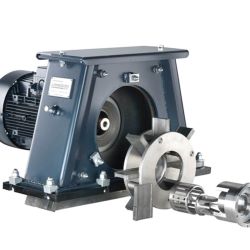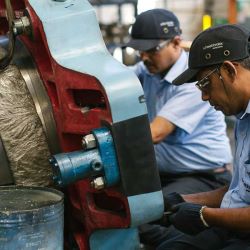Over the last twenty years or so, shot blast descaling (blast cleaning) machines have gradually replaced chemical descaling baths in wire and rod production. Wheelabrator’s Rod and Bar machines, have been at the heart of this transformation.
The advantages of blast wheel cleaning over chemical descaling are many.
It eliminates the need for acid baths and the associated environmental hazards and permitting requirements and offers a more straightforward waste disposal option with less environmental impact as well as enhancing the wire surface for the drawing process.
The Wheelabrator range of Wire Rod machines have been used in treating wire and rod-shaped workpieces for decades. The machines are designed to concentrate the blast descaling energy onto the workpiece using the latest technology and can be adjusted to suit individual workpiece diameters. The latest designs offer a new blast wheel and high blast power allowing the machines to keep up with fastest drawing lines, achieving speeds of up to 240 meters per minute.
In addition, the machines are equipped with features such as intensifier guide plates that automatically adjust to the correct wire diameter, improving the concentration of energy and making the overall drawing line more efficient.
Depending on blast media type and size, the blast process produces a superior surface finish, which improves the adhesion and distribution of the drawing oil lubricant. This is important to achieve the desired drawing quality and to extend the life of drawing dies. Compared to immersion baths, blast machines also take up less room and fit neatly into the drawing line. Ensuring a good surface texture before drawing means fewer die failures and hence reduced down time and reduced die replacement costs.
The homogeneously clean surface provided by the Wire Rod machines also ensures a lower separation rate during crack testing, as well as a clean and bright surface on the final product. Wheelabrator’s Wire Rod machines can be equipped with a range of blast wheel units with various motor capacities to meet the requirements of different drawing speeds, wire or rod diameters, materials and required surface cleanliness.
The machines are slotted into the line ahead of the drawing machines and can be integrated to communicate with the main control system on the line. Guide plates focus the abrasive stream onto the wire surface, thereby boosting the descaling effect without increasing abrasive throughput. This improves the efficiency of the whole blasting process while reducing wear on parts and preventing abrasive wastage.
Frank Connell of the Wheelabrator Burlington (Canada) Technical Center said: “Over the years, our Wire Rod machines have proven their reliability, sturdiness and, not least, their high performance. We continuously modernize, renew and upgrade our technology to ensure our machines keep up with latest high-speed drawing lines and technical requirements of the industry.”


